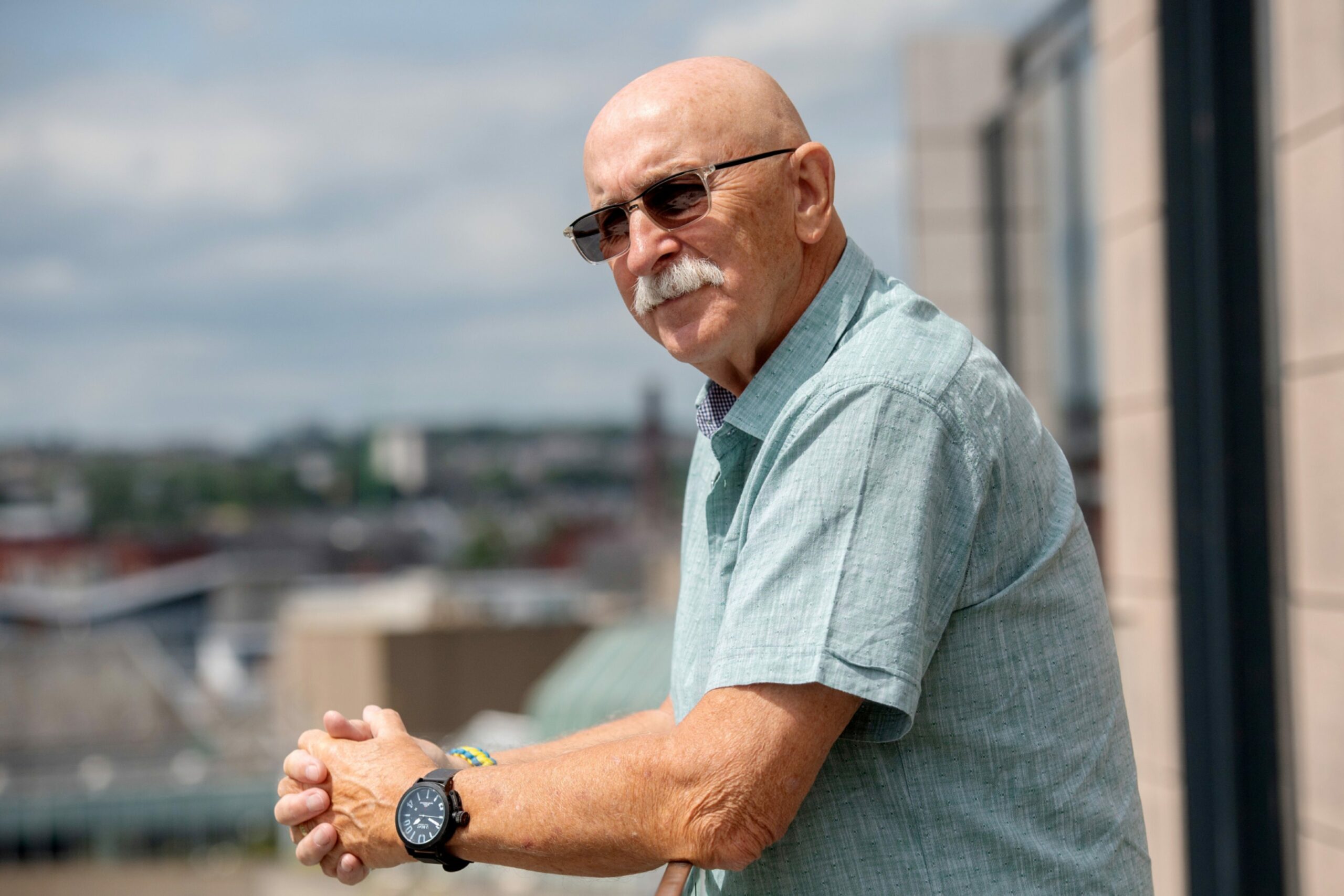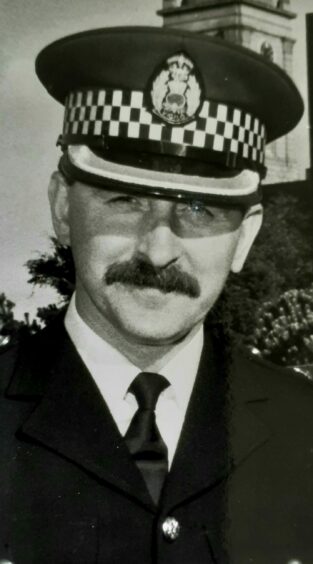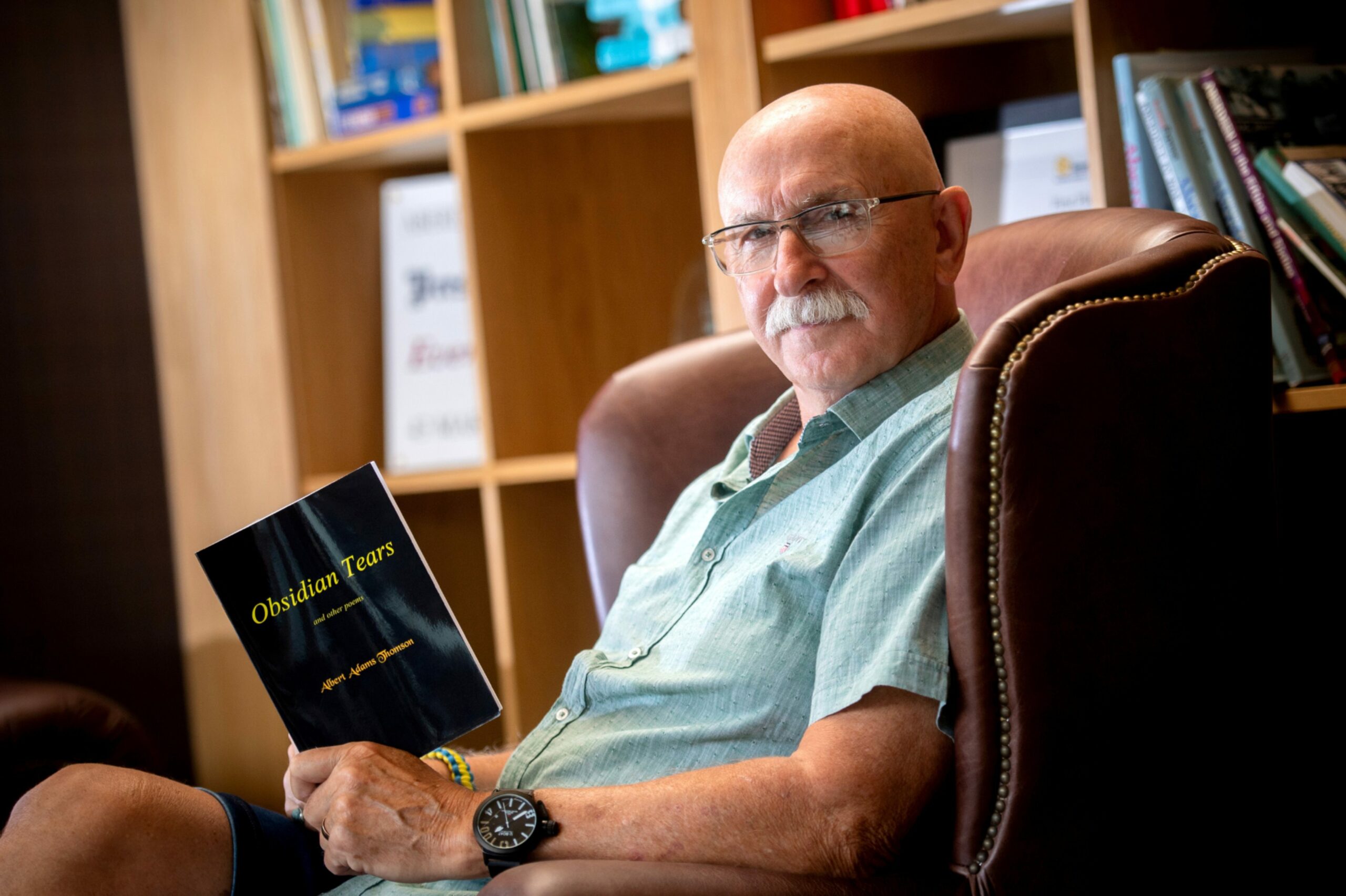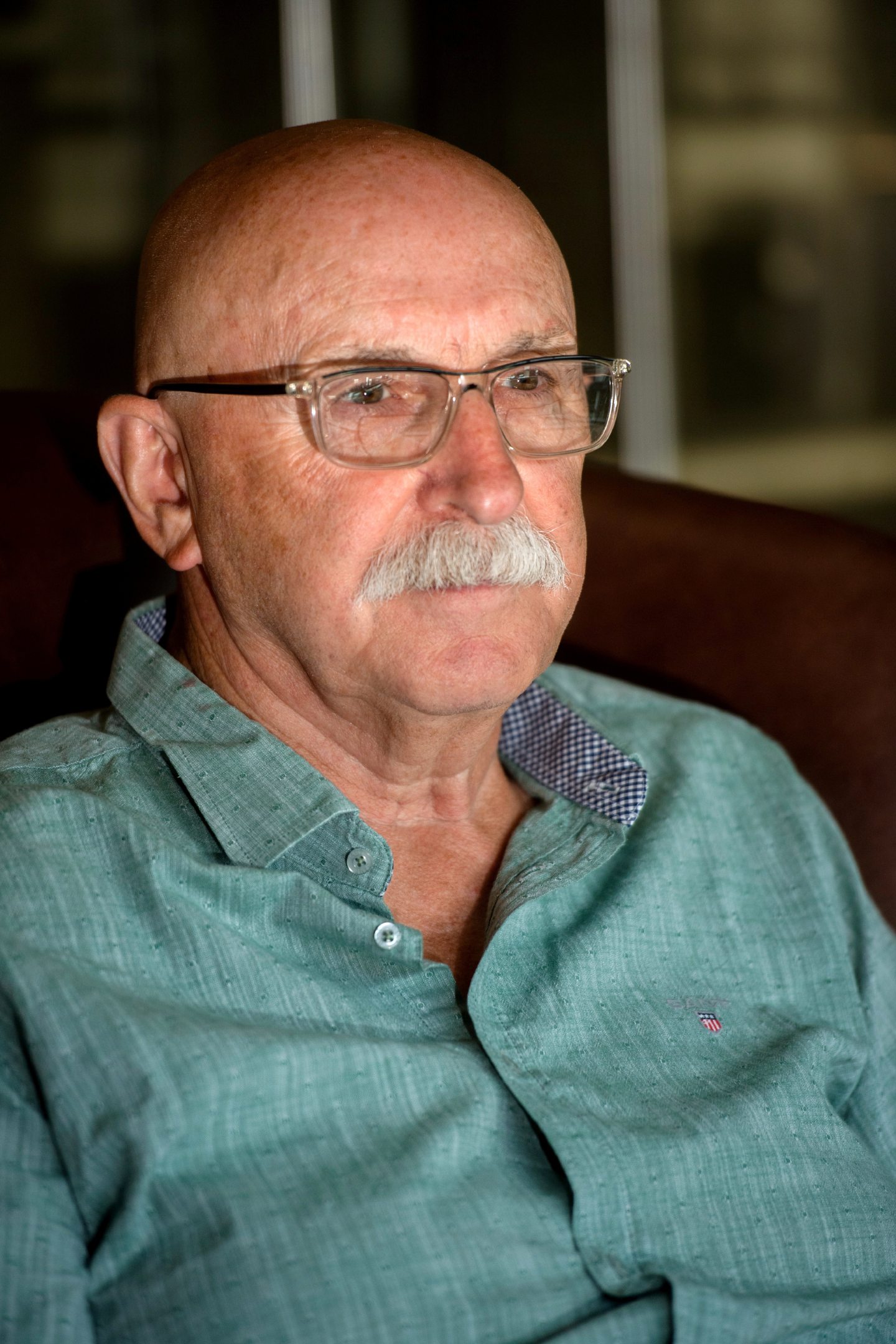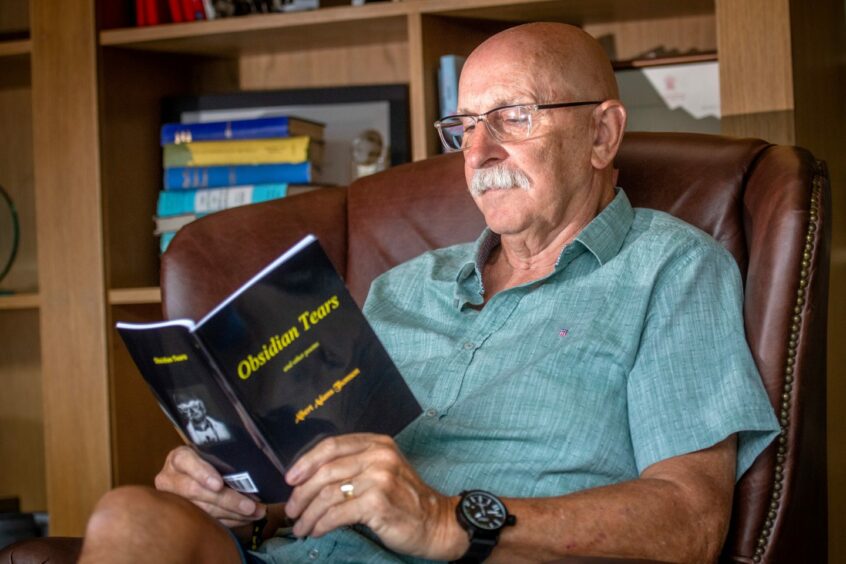
Albert Thomson is no stranger to dealing with tragedy and tristesse.
During his many years as a senior police officer in Aberdeen, he was part of the concerted response to a wide number of catastrophes in the North Sea, including the Chinook Disaster in 1986, the fire on the oil rig, Ocean Odyssey, which happened just two months after Piper Alpha in 1988, and the Cormorant Alpha Disaster in 1992, operating as part of the major incident command and control unit.
In the midst of these traumatic events, the man who served with Aberdeen City and Grampian Police for 30 years, working in operations and a variety of departments from criminal investigation to general enquiries and the force control room, began to write down his thoughts in a series of poems as a means of processing what he had witnessed.
It was a way of expressing his feelings quietly, privately. As he said: “My poetry was never meant to be published. In any case, I never thought anyone would be interested.”
But now, Albert has unveiled a new book Obsidian Tears, inspired by his determination to help the Ukrainian refugees who have relocated to Aberdeen, and talked about his extraordinary life and career: one which has taken him from his north-east roots to becoming a consultant in disaster management and working in 17 countries including Angola, Azerbaijan, Ghana, Portugal, Poland and Vietnam.
The harsh impact of war
Matters changed when he and his wife Linda recently visited the Ukrainian Hub in the Rosemount area of Aberdeen and discovered for themselves the harsh reality of the Russian invasion and the grievous effect it has had on so many people.
The recent news headlines have been dominated by a apparent power struggle inside the Kremlin, allied to Wagner mercenaries turning on the Russians, but whatever transpires, there is no quick fix for those displaced by the hostilities.
Albert said: “The Hub opened our eyes to the impact this unnecessary war is having on Ukrainian people. It provided warmth and a place [for the refugees] to meet fellow Ukrainians, providing English and other classes, activities for children and quiet spaces for those who wish a peaceful environment to reflect and relax.
“It also offers an opportunity to share personal stories, many of which are harrowing. When we visited the classroom, full of children chatting and painting happily, we were surprised to see all the children (aged under 10) were sitting with their schoolbags still on their backs and some with their coats on, but open, and one or two with hats on.
It opened our eyes to the war
“It was explained to us that, back home, they would have to be ready to evacuate quickly if the sirens sounded or explosions were heard in the vicinity.
“This led me to decide to publish what I had done and try and raise some money for Ukrainian refugees in Aberdeen. With some sponsorship from McCue Wealth management, I am able to donate more than would otherwise be the case.
“I have also written a couple of poems about Ukraine, where I have worked in the past, which will hopefully appear in a follow-up poetry book in the future. We have to keep talking about the war and not let it slip out of our minds. This is vital.
“[Vladimir] Putin must not be allowed to succeed because we get fed up hearing about it. The impact upon the country and people is huge and it will leave lasting scars.
“So we must do whatever we can to help for as long as it takes and that includes making the Ukrainian community in the north-east as welcome as possible and assisting them where we can. The book is my small attempt to do so.”
Reactions to difficult incidents
Albert did not, initially, have a particular passion for poetry. But he started to pen funny verse which led to him singing speeches at family weddings, anniversaries and other events. And gradually, he logged his reactions to difficult incidents – “This was a time when we did not really speak about our feelings” – and the words came together.
At the outset, they were never shown to anyone, not even his wife. They were an attempt to rationalise some of the worst excesses of human behaviour and he doesn’t gloss over man’s inhumanity to man and how it influenced him and other officers.
There has been a lot in the media recently about crimes committed by serving officers and the admission by the Chief Constable of Police Scotland, Iain Livingstone, that his organisation is “institutionally racist” and misogynistic. But Albert’s testimony serves as a reminder that there are far more dedicated people than bad apples in the ranks.
‘Not knowing is awful’
As he told me: “All police officers are confronted with death as part of the job and dealing with the family who have been affected. We see the impact that death has on families and they are all different.
“When our youngest son joined the Army and was stationed in war zones, we saw and felt the strain this has on families – in particular being notified when he was injured.
“This experience helped develop Care for People guidelines for family members who have been affected by tragic incidents when they are often wrongly starved of information. All they need is to know. Because not knowing is awful.
“I also developed a strong dislike of the use of the word ‘closure’ when dealing with death. Families never have closure with the loss of a loved one.
“Acceptance yes, but closure – definitely not!!”
Awards for policing
It’s a long time since Albert joined Aberdeen City Police as a cadet in 1967, as the prelude to becoming a constable in 1969 and winning the Baton of Honour at the Scottish Police College in 1970.
He’s not one to indulge in self-aggrandisement, but there have been several baubles and plaudits collected on his peripatetic journey, including the Chief Constable’s Award for community policing initiatives in Torry and receiving a Mention in Orders after rescuing a man from Aberdeen Harbour.
In 1988, he founded the Grampian Police Diced Cap Charitable Trust – an initiative which has since donated more than £1,100,000 to deserving local and national causes before ceasing charitable work, following the creation of Police Scotland.
And his new book, with a foreword by the “Queen of Doric” Sheena Blackhall, is also boosting the lives of others in a positive way. So what, I asked him, does the title actually mean?
An inspirational figure
He replied: “It’s believed that obsidian is a protective stone that shields against negative energy. It’s a sharp stone, so sharp that it’s believed to be able to pierce darkness to reveal truth.
“The stories we heard from some of the 4,000 Ukranians in Aberdeen were harrowing. So Obsidian Tears is the outcome of meeting them. Most of them are women and children, who have left husbands and fathers back home defending their country”.
Albert read one of his poems in the Press & Journal office – which we recorded for posterity – and it was all the more evocative because you could sense he has lived through experiences which most of us would shudder to contemplate.
Yet here he is, fundraising for a fresh cause in his 70s, just as he was in his 40s, packing a lot into his days and refusing to slip quietly into retirement.
He’s an inspirational figure.
Copies of the book are available by emailing Albert at albertthomson@btinternet.com
FIVE QS FOR ALBERT THOMSON
- What book are you reading? The Complete Kobzar; The poetry of Taras Shevchenko (Ukrainian national poet 1814-1861).
- Who’s your hero/heroine? There are many I admire; Robert the Bruce, William Wallace, Robert Burns and from a Turkish perspective [Kemal] Ataturk. However, I will be radical and mention two for their sheer determination against all the odds: Alexander Cruden, the Aberdeen-born author of the Concordance of the Bible and James Barry, who was born Margaret Anne Bulkley, but lived as a man, obtaining a medical degree at Edinburgh University, joining the Army as a military surgeon and becoming Inspector General (Brigadier), the second-highest medical office in the British Army. Her biological sex became known only after she died.
- Do you speak any foreign languages? A little Turkish which slipped during the pandemic.
- What’s your favourite band or music? [The sounds of the] 60s, especially the Rolling Stones, Jimi Hendrix, The Kinks, The Animals and Tina Turner.
- What’s your most treasured possession? The medals of my father (too young to serve during the war, but has medals from the Seven Incorporated Trades of Aberdeen), my father-in-law (wounded and captured at Arnhem), my grandfather (Boer War, First & Second World Wars) and great uncle (North-west Frontier, Boer War and First World War). Our youngest son who recently left the army with an MBE has his own medals.
